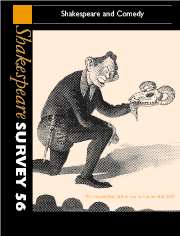Book contents
- Frontmatter
- Looking Like a Child – or – Titus: The Comedy
- Comedy and Epyllion in Post-Reformation England
- (Peter) Quince: Love Potions, Carpenter’s Coigns and Athenian Weddings
- ‘When Everything Seems Double’: Peter Quince, the other Playwright in A Midsummer Night's Dream
- Cultural Materialism and Intertextuality: The Limits of Queer Reading in A Midsummer Night's Dream and The Two Noble Kinsmen
- As You Liken It: Simile in the Wilderness
- Infinite Jest: The Comedy of Hamlet, Prince of Denmark
- Othello and the End of Comedy
- Shakespeare as a Joke: The English Comic Tradition, A Midsummer Night’s Dream and Amateur Performance
- Falstaff’s Belly, Bertie’s Kilt, Rosalind’s Legs: Shakespeare and the Victorian Prince
- The Sixth Act: Shakespeare after Joyce
- The Return of Prospero’s Wife: Mother Figures in The Tempest’s Afterlife
- Directing Shakespeare’s Comedies: In Conversation with Peter Holland
- ‘To Show our Simple Skill’: Scripts and Performances in Shakespearian Comedy
- John Shakespeare’s ‘Spiritual Testament’: A Reappraisal
- Shakespeare as a Force for Good
- Timon of Athens and Jacobean Politics
- Man, Woman and Beast in Timon’s Athens
- Rough Magic: Northern Broadsides at Work at Play
- Shakespeare Performances in England, 2002
- Professional Shakespeare Productions in the British Isles January–December 2001
- The Year's Contributions to Shakespearian Study 1 Critical Studies
- 2 Shakespeare’s Life, Times and Stage
- 3 Editions and Textual Studies
- Books Received
- Index
Comedy and Epyllion in Post-Reformation England
Published online by Cambridge University Press: 28 March 2007
- Frontmatter
- Looking Like a Child – or – Titus: The Comedy
- Comedy and Epyllion in Post-Reformation England
- (Peter) Quince: Love Potions, Carpenter’s Coigns and Athenian Weddings
- ‘When Everything Seems Double’: Peter Quince, the other Playwright in A Midsummer Night's Dream
- Cultural Materialism and Intertextuality: The Limits of Queer Reading in A Midsummer Night's Dream and The Two Noble Kinsmen
- As You Liken It: Simile in the Wilderness
- Infinite Jest: The Comedy of Hamlet, Prince of Denmark
- Othello and the End of Comedy
- Shakespeare as a Joke: The English Comic Tradition, A Midsummer Night’s Dream and Amateur Performance
- Falstaff’s Belly, Bertie’s Kilt, Rosalind’s Legs: Shakespeare and the Victorian Prince
- The Sixth Act: Shakespeare after Joyce
- The Return of Prospero’s Wife: Mother Figures in The Tempest’s Afterlife
- Directing Shakespeare’s Comedies: In Conversation with Peter Holland
- ‘To Show our Simple Skill’: Scripts and Performances in Shakespearian Comedy
- John Shakespeare’s ‘Spiritual Testament’: A Reappraisal
- Shakespeare as a Force for Good
- Timon of Athens and Jacobean Politics
- Man, Woman and Beast in Timon’s Athens
- Rough Magic: Northern Broadsides at Work at Play
- Shakespeare Performances in England, 2002
- Professional Shakespeare Productions in the British Isles January–December 2001
- The Year's Contributions to Shakespearian Study 1 Critical Studies
- 2 Shakespeare’s Life, Times and Stage
- 3 Editions and Textual Studies
- Books Received
- Index
Summary
Two species of comedy particularly disturbed prevailing political and religious mores in Elizabethan England: satire and Ovidian comedy. While the political bite and poisonously bitter aftertaste of satire constituted a pointed assault on the alleged ills of a corrupt society, Ovidian comedy, in contrast, had no agenda. Precisely because it eschewed moral and political purposes in favour of eroticism and myth, Ovidian comedy, although it proved more difficult to contain than satire, was as widely condemned. Purged of all moral and political aims, this striking absence of purpose was perfected in the epyllion, rendering it not only a purer form of comedy, but also a supremely and irreducibly literary one. The argument I will prosecute here is that the epyllion of the 1590s - though it has suffered considerable critical neglect and misapprehension - is a complex and supremely important moment in the history of literary comedy.
William Shakespeare was born a year prior to the publication of Arthur Golding’s The XV Bookes of P. Ouidius Naso, entytuled Metamorphosis . . . (1565). Shaped by an unprecedented manifestation of English Christianity, Shakespeare’s generation went on from an early introduction to Latin authors in the grammar schools to more profound encounters with classical paganism. In what follows, I will examine the absorption and iteration of the Roman poet Ovid in 1590s epyllia that was to be found neither in the decades that preceded it nor in those that were to follow in poetry characterized by a divorce both from didacticism and from immediately political purposes. Marked primarily by its distinctive tone – ebullient, racy, urbane and yet by turns sombre and even tragic – the epyllion’s species of literary sensibility is far closer to Ovid’s subtle modulations of voice in the Latin original than its precursors. In particular, I will argue that the libidinal energy carried by the comedic aspects of the epyllion renders this poetry more wholly and unapologetically literary in our modern sense, and it is so because of a certain complex but inevitable negotiation with Christianity. My bigger if more tentative claim is that the species of Ovidianism that flowers in the 1590s belongs, conceptually speaking, not only in its substance, but also vitally in its comedic expression to the period’s anticipation and, ultimately, its inauguration of a definitively secular modernity.
- Type
- Chapter
- Information
- Shakespeare SurveyAn Annual Survey of Shakespeare Studies and Production, pp. 27 - 38Publisher: Cambridge University PressPrint publication year: 2003
- 1
- Cited by

